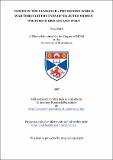Voices in the clangour : the Second World War through the eyes of selected women writers in Britain and Italy
Abstract
Since early times, many women have been aware that their vision of war is one of the elements marking their difference from the opposite sex. The Greek poetess Sappho was the first to express clearly the fact that the feminine view of the universe is informed with love, while war, weapons and the ideals of heroism and honour dominate the masculine world. It is traditionally accepted that, throughout the history of Western culture, from the very beginning to the present age, women--both as writers and as individuals--have generally assumed a peripheral role in wartime; nevertheless, in twentieth-century literary productions, their attitudes towards war appear to be far more "aware" and active than one might suspect. In particular, by reading women's works written during and about the Second World War, the signs of their- development in war thought can be clearly seen. Even if love and sentiment have remained among the most common feminine feelings in wartime, a large number of women have put them into action, in order to help their men, their families and their countries in dangerous circumstances. Needless to say, female involvement--both "emotional" and "effective"--in war has been mirrored in written works belonging to different literary genres, as appears from even a first glance at some cultural European contexts--in this case the British and the Italian. The works of some British poetesses, a novel by the Italian Renata Vigano and the reports and memories of both British and Italian ordinary women--all produced during and dealing with the Second World War--offer adequate grounds for enquiring into the existence of a feminine dimension of war. The examination of two different geographical and cultural areas--instead of a single one--enables the discovery of the general features of women's war thought: in fact, while the obvious discrepancies might be basically ascribed to the peculiar events and aspects characterising our two countries, the affinities might be referred to the common circumstances and feelings experienced by contemporary women during wartime.
Type
Thesis, MPhil Master of Philosophy
Collections
Items in the St Andrews Research Repository are protected by copyright, with all rights reserved, unless otherwise indicated.

